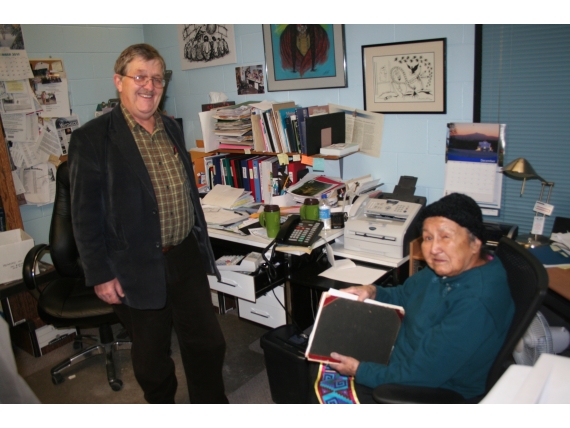Church Responds to Diet Experiments in Residential Schools
By Mike Aiken
Earlier this week, news reports described experiments in nutrition run through two residential schools in Kenora. They included children at C.J. and St. Mary's during the 1940's and 1950's. On Friday, Steve Allen from the Presbyterian Church in Canada responded to the research by Dr. Ian Mosby. "Reading his paper is chilling, and it's really painful. Dealing with the legacy of the residential schools doesn't have an easy beginning and end. These things emerge," said Allen, who heads the justice ministries programs on behalf of the church. Mosby is a post-doctoral researcher at the University of Guelph. He recently published an academic article, which described experiments designed to help aboriginal people make the transition from a traditional diet to more mainstream foods. In his paper, Mosby writes "The experiment therefore seems to have been driven, at least in part, by the nutrition experts’ desire to test their theories on a ready-made 'laboratory' populated with already malnourished human 'experimental subjects.' " Mosby further emphasizes that the research was carried out without the informed consent of the parents or children involved. He further argues: "J. R. Miller has argued that the early architects of Canada’s residential school system saw the schools as “social laboratories in which people’s beliefs and ways could be refashioned.”57 But as these experiments made clear, the systematic neglect and mistreatment of students in these schools also made them into ideal scientific laboratories. For Pett and his research team, in particular, the malnourished Aboriginal subjects of these experiments provided the means to weigh in on a number of scientific controversies, including ongoing disagreements over the effectiveness of dental interventions like fluoride treatment versus nutritional supplementation for maintaining an individual’s oral health. Indeed, when researchers learned that Indian Health Services dentists had visited the Alberni, St. Mary’s, and Cecilia Jeffrey’s schools in the early years of the study, the research team quickly sent off telegrams and [End Page 162] letters insisting that, for the duration of the study, “no specialized, over-all type of dental service should be provided [to the students], such as the use of sodium fluoride, dental prophylaxis or even urea compounds.” It was argued that, because dental caries and gingivitis were both “important factors in assessing nutritional status,” any significant dental interventions would interfere with the results of the study.58 Students in the experimental schools, in other words, were denied treatment that other students would have had access to during the five year study period." In some cases, the lack of consent by a vulnerable people was apparent: "Pett, of course, neglected to mention that his study was largely made possible because of his access to a population of chronically malnourished and vulnerable children who, as wards of the state, had little say in whether or not they participated in the study. Nor did he mention that the success of the study depended on so-called “controls” and experimental subjects alike being fed, for anywhere between two and five years, diets known to be nutritionally inadequate or, for that matter, that they were being actively denied certain types of dental care for the duration of the study. The anemia that developed among students at St. Mary’s, moreover, seems to have simply highlighted one of the main barriers to the kinds of human experiments being advocated by Pett – when confronted with the possible risks, few would consciously choose to allow themselves or their children to take part in such a study." In the end, Mosby concludes, "Ultimately, it seems that none of these experiments and studies conducted between 1942 and 1952 had much in the way of long-term positive effects on the lives of those being studied."
|
.
Any original material on these pages is copyright © BishopAccountability.org 2004. Reproduce freely with attribution.
